Chinese e-commerce is on the rise and presents a great opportunity for beauty and cosmetics brands. With over 700 million online shoppers, China has the world’s largest online population. In this article, we list the best Chinese marketplaces for beauty and cosmetics brands to sell their products. We also outline the advantages and disadvantages of each marketplace. So whether you’re just starting out or looking to expand into China, read on to find out which platform is right for you!
What Are The Most Popular Online Chinese Marketplaces
Your first consideration before attempting to enter the online Chinese marketplace is understanding the biggest platforms used by its citizens. There are around 1.4 billion people in the country today, and 970 million of those have access to a smartphone. Most of these users use the following sites for their online shopping needs.
1. Taobao and Tmall
Taobao is China’s largest online retailer, with a whopping 755 million users in 2019 alone. The name translates to “search for treasure,” alluding to the hundreds of millions of listings on the platform. Oftentimes, Taobao is referred to as the Chinese eBay because of its popularity and assortment of products.
One factor that added to Taobao’s status is how it enables small businesses, entrepreneurs, and designers to reach out to their target customers. The platform encourages these often independent companies to promote their products during “Festivals.” In addition, communication between sellers and customers is enabled, providing a more personalized experience for users.
Tmall is the sister company of Taobao, classified as a B2C platform offering more high-end goods. As such, entry as a seller is more restricted since quality assurance is the priority of this platform. Still, foreign companies like Calvin Klein and Gucci have pages in Tmall.
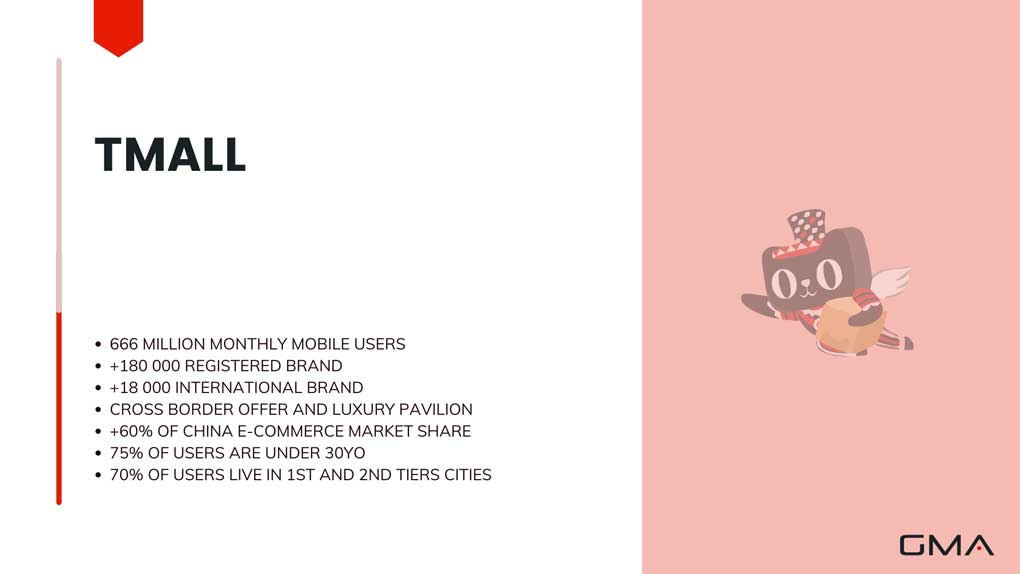
There are a number of benefits to selling on Tmall for brands, including:
- Increased reach – Tmall is China’s largest and most popular online shopping platform, with over 600 million active users. This gives brands access to a massive audience of consumers who are interested in buying branded products.
- Increased visibility – Brands that sell on Tmall are given greater visibility on the platform, which helps them to stand out from the competition and attract more shoppers.
- Enhanced credibility – Selling on Tmall helps brands to build up their credibility and trustworthiness among Chinese consumers. This can lead to increased sales and a stronger brand reputation in China.
There are a few potential cons of selling on Tmall for brands. First, it can be difficult to get accepted onto the platform. Tmall is very selective about which brands they allow selling on their site, and they often have very high standards. Second, it can be expensive to sell on Tmall. The platform takes a significant commission on all sales, so brands can end up paying a lot of money in order to sell their products through Tmall. Finally, it can be challenging to stand out among all the other brands that are selling on Tmall. With so many sellers competing for attention, it can be difficult for brands to make their products stand out and attract
2. Pinduoduo
Having only started in 2013, Pinduoduo has quickly risen to become the biggest rival of Alibaba-operated Taobao. It’s slowly taken over many smaller Chinese cities and amassed more than 700 million users, a figure that’s expected to rise. While it has similar features to Taobao, Pinduoduo functions as a social e-commerce platform.
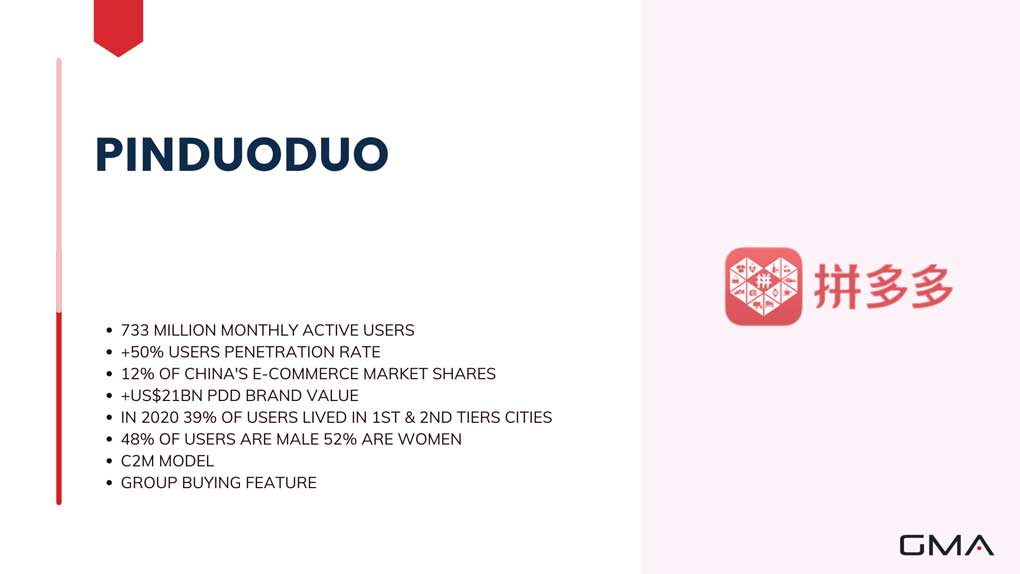
This pioneering marketing strategy focuses on live selling, group purchases, and affiliate programs that function much like social media platforms. This approach encourages connections and interactions with other customers, elevating the online shopping experience. In addition, the platform has a recommendations-based model that imitates how people would shop in real life.
There are a few reasons why Pinduoduo is a great platform to sell in China for small brands. First, there’s the low cost of entry. There’s no membership fee to join Pinduoduo, and you only need to pay a commission on sales (which is relatively low). This makes it easy for small brands to get started without investing too much money. However, the average basket is a lot lower than on an app such as Tmall or JD and counterfeiting is a real issue.
3. JD.com
At 570 million annual users, JD.com is still a major competitor in the country. It’s been around since 1998 and initially focused on selling household appliances and electronics. The company has been slowly diversifying and adapting to the more modern Chinese marketplace. So, the platform now carries other products in the beauty industry and grocery segment.
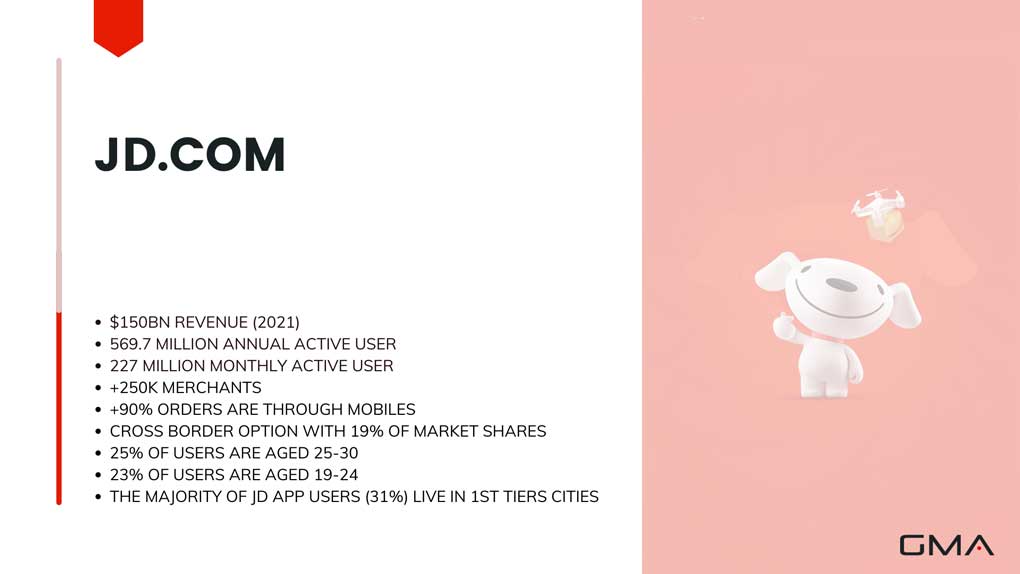
The biggest advantage the company has is its streamlined warehousing and logistics infrastructures. These are some of the factors that allowed them to open JD Worldwide, a platform that lets foreign brands sell their products in China. So, for companies that don’t have logistic capabilities in the country, JD.com becomes one of their go-to partners.
Niche Chinese Online Marketplaces for Beauty Brands
The sites mentioned above are quite competitive, so foreign brands in more specialized industries might find it hard to penetrate the Chinese market through them. However, there are still other platforms where particular industries thrive, especially beauty brands.
In China, the monthly retail trade revenue of cosmetics and beauty products reached CNY 62 billion monthly in January 2022 alone. That translates to $116.76 billion annually, making the country the second biggest market for the beauty industry after the US.
1. VIP.com
Operated by Vipshop, VIP.com is the most prominent Chinese marketplace that features online discount sales, making it appeal to consumers that are looking for great deals. Beauty and cosmetics products make up a huge chunk of their listings, but the platform also has home appliances and electronics. Vipshop provides an avenue for brands to quickly and easily monetize high volumes of inventory. In doing so, they are able to reach new customers across China while meeting their desire in customer data analysis as well as managing the supply chain aspect by providing insights that help them make better decisions about what products or sizes will be most profitable going forward

VIPshop has a unique business model where they do not charge any membership fees or commissions, the platform purchase directly from the brand. The only downside to this site is that smaller brands/brands with low awareness can rarely make it on the app because there are so many pre-purchasing options available for users who want something good quality without having too much trouble finding listings from small businesses owners like yourself!
Like JD.com, Vipshop also has a cross-border e-commerce platform called Vip International. Through it, foreign companies can introduce their beauty and cosmetics catalogs to China’s large market. Since it’s more popular in the country’s numerous small cities, your brand will reach a wider and more diverse audience.
2. RED Store on the Little Red Book/ Xiaohongshu
Also known as Little Red Book, RED is a major e-commerce platform that specializes in the beauty and cosmetics industry. It’s another social media and e-commerce site hybrid that combines the best qualities of the two. Because of influencers and other prominent figures in Chinese pop culture, RED quickly rose to become one of the biggest e-commerce platforms in recent years, with more than 200 million users. Since it mostly carries luxury brands, beauty products, and cosmetic goods, RED is primarily used by women.
RED’s most stand-out feature is how it encourages product research through reviews, articles, and ratings. This allows customers to scrutinize products more closely, leading to a better shopping experience and quality products overall.

Cosmetics brands should consider having a flagship store on the Little Red Book app for a few reasons. Little Red Book is a news and information content platform with over 300 million monthly active users that are mostly women from 1ST and 2nd tiers Chinese cities. These users have a strong interest in lifestyle including beauty and fashion. This gives brands a way to reach a large and engaged audience. Additionally, Little Red Book offers businesses a suite of tools to help them manage their presence on the platform, including branding, marketing, and customer service features. Finally, having a flagship store on Little Red Book can help brands build trust and credibility with Chinese consumers.
3. Yunji
Yunji is another internet-based shopping platform that only started in 2015. While it’s one of the newest ones, it’s been steadily growing thanks to its strategic marketing structure. It has similar restrictions to RED and Tmall, allowing only trusted and established brands to sell on their site.
This makes the platform particularly suited for cosmetics and beauty products since these attract a specific customer niche. These are usually the affluent citizens who can afford more expensive items for daily use. It’s also open to foreign brands, allowing these companies to integrate themselves into the lives of modern Chinese consumers.
4. Suning
Suning is among the largest non-government-owned e-commerce platforms in the country. This one is focused on home appliances and electronics, but they also carry cosmetics, household commodities, and other non-electronic goods.
The company’s strongest suit is its ability to provide services, especially for its appliances and electronics. Aside from the online platform, Suning operates a chain of retail stores where customers can bring their products for configuration and repairs. Suning also is a cross-border platform, ideal for brands that don’t have a foothold in china’s mainland yet.
Types of Chinese Online Marketplaces
There are two main categories of the e-commerce marketplace in China: local and cross-border. Knowing the difference between each will help you determine the best one for your foreign beauty brand.
Local e-Commerce
As the name implies, local e-commerce is where businesses can sell their goods to online shoppers within their locality. It’s a type of offline-to-online selling that prioritizes the companies and commercial organizations within a specific territory. This offers a shorter waiting time for shipping and a higher level of convenience for consumers.
Many of the bigger platforms mentioned are local e-commerce sites, such as Taobao and Pinduoduo. These aren’t suitable for foreign brands since they’d need local stores to be able to use the platforms.
Cross-Border e-Commerce
Cross-border e-commerce is better suited for companies outside of China. These platforms are dedicated to introducing their products to a more local market, enabling users to access goods outside of their country.
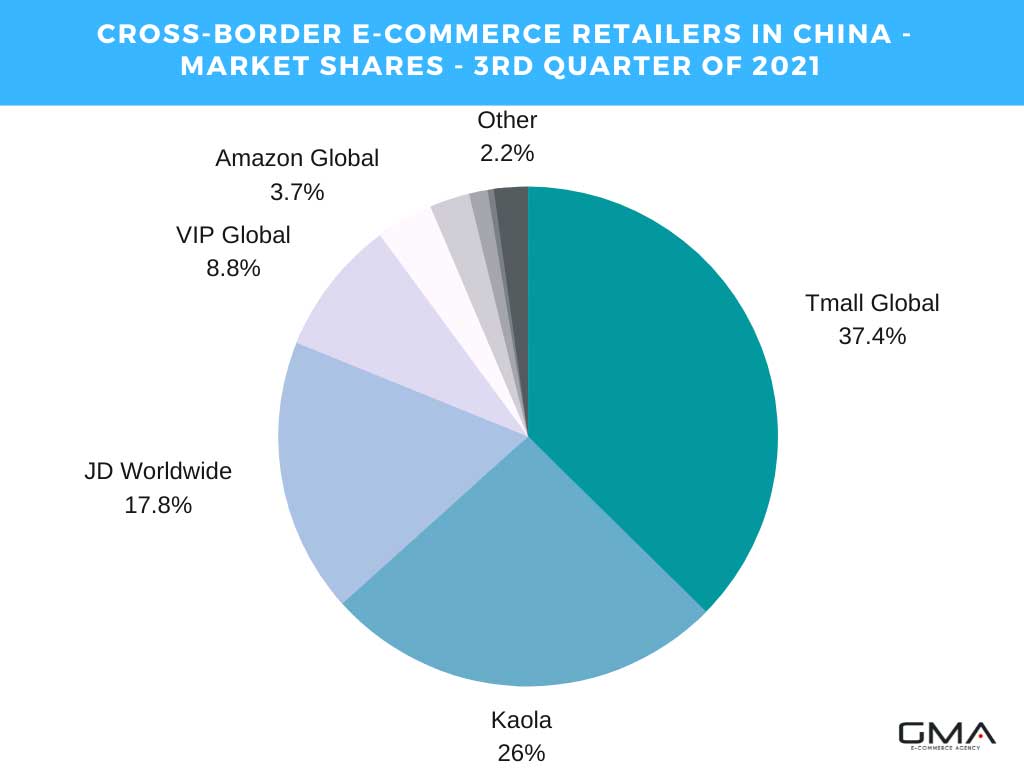
Tmall, Vip International, JD Worldwide, and Yunji are examples of these platforms. They serve as third-party stores where foreign brands can list their goods and sell them to local citizens. This enhances recognition and demand, increasing a company’s revenue in the international market.
Can You Sell Your Beauty Products on Chinese Marketplaces?
Given the prolific cross-border e-commerce platforms in the country, foreign companies now have many opportunities to introduce their brands to Chinese consumers. Before you proceed, you first need to understand all the legal requirements, online shopping culture, and other factors that can affect your venture.
The Chinese government wants to protect its domestic market, so there are a few roadblocks you need to get over to guarantee success. With the huge market in the country, even a small percentage of consumers will make a significant difference. So, do your research thoroughly and make strategic approaches.
Which Chinese Marketplace Is Best for My Beauty Brand?
There is no definite answer to this since your success still depends on many other factors aside from the platform used. RED, Yunji, and Tmall are great places to begin since they have a market that prefers skincare and cosmetic products. Still, you can try the bigger platforms and make use of other strategies like influencer marketing and PPC ads to stand out. Whatever the case, you need intensive research to see which approach aligns best with your goals and your budget.
Want to start selling your beauty brand on Chinese marketplaces?

If you’re thinking about breaking into the Chinese eCommerce market, then you might be wondering whether or not it’s worth hiring an agency to help with your strategy. The short answer is: yes, it’s definitely worth it!
An agency that specializes in China e-commerce will have a deep understanding of the local market and what works (and doesn’t work) when it comes to online shopping. They’ll know which platforms are popular, what kind of messaging resonates with shoppers, and how to navigate the often-complex regulatory landscape. All of this knowledge is invaluable if you want to be successful in China.
Contact us to understand how we can help you succeed in the Chinese market.

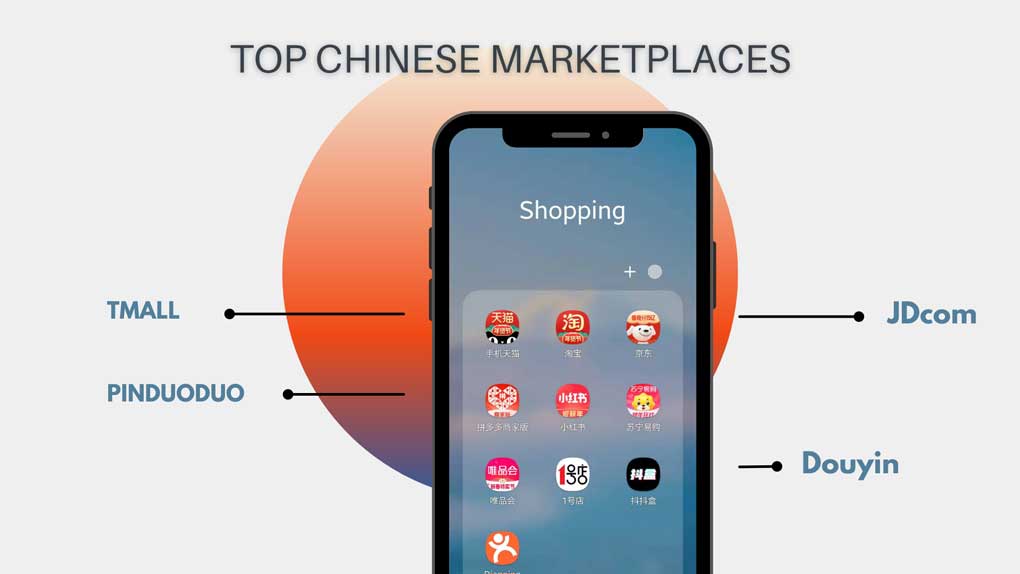
2 comments
Samiran Das
buy interest all sorts of beauty ladies cosmetic in Dhaka capital city of Bangladesh
plz add my wehatsapp +8801731608116
Philip Chen
Chinese business is more and more complicated in 2022.
You have to be agile